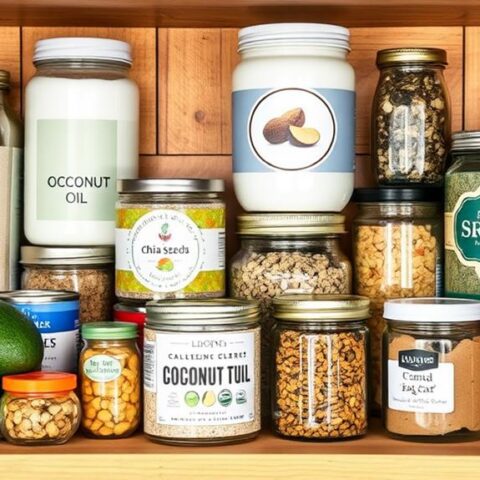
Tofu is an excellent low-carb plant protein option, containing only 1.9 grams of net carbs per 100-gram serving. Different varieties offer varying carbohydrate levels, from silken tofu at 1.1 grams to firm tofu at 2.8 grams per 100 grams. With 8 grams of protein per serving and just 76 calories, tofu provides a complete protein source while supporting blood sugar stability and heart health. Its versatility in cooking methods and preparations reveals numerous nutritional advantages.
Key Takeaways
- Tofu is a low-carb food containing only 1.9 grams of net carbs per 100 grams, making it suitable for carbohydrate-restricted diets.
- Different varieties of tofu range from 1-2.8 grams of carbs per 100 grams, with firmer types generally containing more protein.
- As a complete protein source, tofu provides 8 grams of protein per 100-gram serving with just 76 calories.
- Tofu has significantly fewer carbs than other plant proteins like tempeh (7.6g) and quinoa (39g per cup).
- Various cooking methods like roasting, marinating, and crumbling make tofu a versatile low-carb protein option for multiple dishes.
Understanding Tofu's Nutritional Profile
Tofu stands as a remarkable low-carb food option, offering an exceptional nutritional profile that aligns perfectly with carbohydrate-conscious dietary needs. With just 1.9 grams of net carbs per 100 grams, this versatile plant-based protein seamlessly integrates into any low-carb diet while delivering substantial nutritional benefits.
The protein content of tofu positions it as a complete protein source, providing all essential amino acids with 8 grams per 100-gram serving.
At only 76 calories and 1.6 grams of fat per serving, tofu presents a heart-healthy option for those seeking to maintain their protein intake while managing carbohydrates. Its ability to absorb flavors makes it an adaptable ingredient that can enhance the nutritional value of various dishes without compromising dietary restrictions.
The Science Behind Tofu's Carbohydrate Content
The fascinating process behind tofu's minimal carbohydrate content lies in its unique production method and biochemical composition. When soy milk undergoes coagulation, the resulting plant protein maintains a remarkably low carbohydrate content of just 1.9 grams of net carbs per 100 grams. This transformation creates a nutrient-dense food that supports a balanced diet while keeping carbohydrates minimal.
| Type | Net Carbs (g/100g) | Protein (g/100g) |
|---|---|---|
| Silken | 1.9 | 7.2 |
| Firm | 1.8 | 8.1 |
| Extra Firm | 1.7 | 9.0 |
The scientific process of tofu production effectively concentrates protein while minimizing carbohydrates, making it an excellent choice for those seeking high-protein, low-carb options. This characteristic enables tofu to support blood sugar stability while delivering essential nutrients.
Comparing Tofu to Other Plant-Based Proteins
When comparing tofu to other plant-based proteins, its remarkably low net carb content of 1.9 grams per 100 grams stands out against alternatives like tempeh, which contains 7.6 grams, and nutritional yeast at 6.4 grams per serving.
Tofu's versatility in both low-carb and standard diets makes it an excellent choice for those seeking to reduce carbohydrate intake while maintaining adequate protein levels.
The significant difference between tofu's carb content and that of traditional plant proteins like quinoa (39g per cup) and chickpeas (27g per cup) positions it as a prime choice for health-conscious consumers looking to balance their macronutrient intake.
Protein Content Analysis
Understanding protein content variations among plant-based foods reveals significant differences between popular options in the low-carb category.
While tofu provides 8 grams of protein per 100 grams with minimal net carbs of 1.9 grams, other protein sources offer distinct nutritional profiles.
Tempeh emerges as a protein powerhouse with 20 grams per 100 grams, though it carries a higher carb content.
Pea protein concentrate delivers the highest protein density at 24 grams per 30-gram serving, making it an efficient option for those following a vegan diet.
Nutritional yeast and hemp seeds present alternative low-carb protein sources, containing 7.6 and 6.3 grams of protein respectively, while maintaining negligible carbohydrate levels comparable to tofu.
Versatility Across Diets
Comparing tofu's versatility against other plant-based proteins reveals its exceptional adaptability across various dietary frameworks, from ketogenic to Mediterranean eating patterns.
As a versatile ingredient, tofu's low-carb profile of 1.9g net carbs per 100g makes it particularly suitable for carbohydrate-restricted diets, while its 8g of protein content supports healthy muscle maintenance.
Unlike limited-use ingredients such as spirulina, this soy product seamlessly integrates into both savory and sweet dishes, offering greater culinary flexibility than many plant-based alternatives.
When incorporating tofu into low-carb meal plans, it's essential to evaluate the carbohydrate content of accompanying ingredients, as complementary foods can greatly impact the overall macronutrient profile of plant-based diets.
Net Carbs Breakdown
The net carb composition of tofu establishes it as a standout choice among plant-based proteins for low-carb dietary regimens. At just 1.9g of net carbs per 100g serving, tofu ranks favorably when compared to other plant-based protein sources, making it particularly suitable for carb-conscious individuals.
When examining the spectrum of plant-based proteins, tofu's carb content proves significantly efficient. While tempeh contains 7.6g of net carbs per 100g and edamame carries 8g per cooked cup, tofu maintains a lower carb profile while delivering comparable protein benefits.
For those seeking even lower-carb alternatives, pea protein and spirulina offer options at 1g per scoop and 0.5g per tablespoon, respectively. These variations in net carbs allow individuals to make informed choices when incorporating plant-based proteins into their dietary components.
Different Types of Tofu and Their Carb Counts
Different types of tofu exhibit varying carbohydrate content, with silken tofu containing 1.1g per 100g compared to firm tofu's higher 2.8g per 100g.
Regular and super-firm tofu varieties maintain lower carb counts at 1.2g and 1g per 100g respectively, while extra-firm tofu contains a moderate 2.4g of carbs per 100g.
These variations in carbohydrate content result from the pressing and processing methods used during production, with firmer varieties generally containing more concentrated nutrients due to their reduced water content.
Firm Vs Silken Carbs
Exploring the world of tofu varieties reveals distinct carbohydrate profiles among different textures and preparations. Firm tofu contains 2.8 grams of carbs per 100 grams, making it the highest in carbohydrate content among common varieties, while silken tofu offers just 1.1 grams per 100 grams.
Despite this difference, both remain excellent low-carb protein sources suitable for carbohydrate-conscious diets.
The variation in carb content between firm and silken tofu stems from their processing methods and water content. Firm tofu's denser texture results in slightly higher carbohydrate concentration, yet it maintains its status as a versatile plant protein option.
Silken tofu's smoother, more delicate consistency corresponds with lower carb levels, making it particularly suitable for those seeking minimal carbohydrate intake while maintaining adequate protein consumption.
Pressed Tofu's Carb Content
Pressed tofu varieties display distinct carbohydrate profiles, ranging from super-firm tofu's minimal 1 gram per 100 grams to regular pressed tofu's 1.9 grams of net carbs.
Extra-firm tofu contains approximately 2.4 grams of carbohydrates, while firm tofu has slightly more at 2.8 grams per 100-gram serving.
These low carbohydrate levels make pressed tofu an excellent plant protein option for those following low-carb diets.
When compared to other protein sources, all pressed tofu varieties maintain consistently low net carbs while delivering substantial protein content.
The variation in carbohydrate content between different pressed tofu types is minimal, allowing consumers to choose their preferred texture without greatly impacting their carbohydrate intake goals.
Raw Tofu Nutrition Facts
Raw tofu comes in several varieties, each offering distinct nutritional profiles while maintaining consistently low carbohydrate content. Standard raw tofu contains approximately 1.2 grams of carbs per 100 grams, making it an excellent choice for low-carb dietary plans.
The nutrition facts vary among different types, with silken tofu containing 1.1 grams of carbs per 100 grams, while firm tofu provides 2.8 grams. Extra-firm tofu delivers 2.4 grams of carbs and an impressive 17.3 grams of protein content per serving.
Super-firm tofu stands out as the most concentrated option, with just 1 gram of carbs and 15 grams of protein per 100 grams. These variations make tofu a versatile plant-based protein source that easily fits into carbohydrate-conscious meal planning.
Health Benefits of Including Tofu in Low-Carb Diets
Incorporating tofu into a low-carb diet offers a wealth of health benefits that extend far beyond its minimal carbohydrate content. With only 1.9g of net carbs per 100g, this versatile plant protein provides 8g of complete protein, supporting muscle maintenance while adhering to low-carb dietary goals. Research indicates that regular tofu consumption may considerably reduce the risk of type 2 diabetes by helping stabilize blood sugar levels. Additionally, the isoflavones found in tofu contribute to heart health and may offer protection against various forms of cancer. For those following a low-carb lifestyle, tofu serves as an excellent nutrient-dense food choice, delivering essential vitamins and minerals without compromising carbohydrate restrictions, making it an invaluable addition to a balanced, health-conscious diet. Including tofu in a keto diet can aid in blood sugar management by improving insulin sensitivity and reducing HbA1c levels, vital for effective diabetes control.
Best Cooking Methods for Low-Carb Tofu Dishes
Several effective cooking methods allow tofu to maintain its low-carb integrity while maximizing its flavor potential and texture.
Roasting firm or extra-firm tofu at 400°F for 25-30 minutes creates a desirable crispy texture, while marination enhances its taste without adding carbs. For those seeking protein-rich, low-carb options, incorporating tofu into soups and stews provides a nutritious alternative with only 2.8g of carbs per 100g serving.
Properly prepared tofu offers a protein-packed, low-carb option that's versatile enough for any meal, from crispy roasted cubes to hearty stews.
Tofu's versatility extends to breakfast alternatives, where crumbled firm tofu can be transformed into satisfying scrambles with vegetables and spices.
Additionally, silken tofu serves as an excellent base for smoothies and desserts, contributing creaminess while keeping carbohydrates minimal at 1.1g per 100g serving, making it an adaptable ingredient for various low-carb cooking applications.
Tofu's Role in Ketogenic and Low-Carb Lifestyles
Tofu's remarkably low net carbohydrate content of 1.9g per 100g serving positions it as an excellent protein source for those following ketogenic and low-carb dietary protocols. The favorable protein-to-carb ratio in tofu enables practitioners to maintain their daily macronutrient targets while consuming sufficient protein for muscle maintenance and satiety. The efficient conversion of tofu's protein into energy, combined with its minimal impact on blood sugar levels, makes it an invaluable component for individuals seeking to optimize their low-carb lifestyle goals. Additionally, tofu is a plant-based protein option that complements the diverse range of proteins suitable for a ketogenic diet.
Carb Content Analysis
With just 1.9 grams of net carbs per 100 grams, tofu stands as an exceptional choice for individuals following ketogenic and low-carb dietary protocols.
This versatile plant protein delivers 8 grams of protein per 3.5-ounce serving while containing only 76 calories, making it an efficient option for weight management and muscle maintenance.
The minimal net carbs in tofu allow for greater flexibility within daily carbohydrate restrictions, particularly beneficial for those adhering to strict low-carb diets.
While tofu may not naturally provide the high fat content typical of ketogenic foods, it can be effectively paired with healthy fats to create balanced, satisfying meals.
Its adaptable nature enables incorporation into various low-carb recipes, ensuring sustainable adherence to carbohydrate-restricted eating plans.
Protein-to-Carb Conversion Benefits
Understanding the protein-to-carb conversion benefits of tofu reveals its exceptional role in ketogenic and low-carb dietary protocols. The high protein content of tofu, combined with minimal carb intake, makes it an ideal food for maintaining stable blood sugar levels while supporting muscle preservation.
| Benefit | Impact |
|---|---|
| Protein Ratio | 8g protein per 1.9g net carbs |
| Caloric Efficiency | 76 calories per 100g serving |
| Blood Sugar | Minimal glycemic response |
For those following low-carb lifestyles, tofu's versatility extends beyond its favorable macronutrient profile. Its ability to provide sustained energy without significant carbohydrate impact makes it particularly valuable for individuals seeking to optimize their protein intake while maintaining strict carb limitations.
Common Myths About Tofu and Carbohydrates
Several persistent myths about tofu's carbohydrate content continue to circulate among health-conscious individuals and those following low-carb diets.
One common misconception is that tofu contains high levels of carbohydrates, when in fact it provides only 1.9 grams of net carbs per 100 grams. This makes tofu an excellent option for low-carb and vegan diets alike.
Another widespread misunderstanding involves tofu's protein quality, with some believing it lacks complete protein content.
In reality, tofu serves as a complete protein source, delivering 8 grams of protein per 100 grams while maintaining minimal carbohydrate content.
These facts demonstrate that tofu can effectively support various dietary goals, particularly for those seeking to maintain low-carb intake while ensuring adequate protein consumption.
Additionally, incorporating tofu into a ketogenic diet can aid in managing blood sugar levels, making it a beneficial choice for individuals aiming to improve glycemic control.
Optimal Portion Sizes for Low-Carb Tofu Consumption
Determining the right portion size of tofu plays an essential role in maintaining a successful low-carb diet while meeting nutritional needs. A standard serving of 100 grams (3.5 ounces) of tofu contains only 1.9 grams of net carbs while providing approximately 8 grams of protein, making it an excellent meat substitute for those monitoring their carbohydrate intake. To optimize nutrient intake while keeping carbs low, consumers should measure their tofu portions carefully. A single serving can be incorporated into meals alongside non-starchy vegetables and healthy fats, creating balanced, low-carb dishes. This portion size allows individuals to benefit from tofu's high protein content of 17 grams per serving while staying within their desired carbohydrate limits, making it an ideal choice for various low-carb dietary approaches. Additionally, the ketogenic diet's ability to enhance fat oxidation can complement the consumption of tofu in promoting effective fat burning and weight management.
Pairing Tofu With Other Low-Carb Ingredients
Pairing tofu with complementary low-carb ingredients maximizes both its nutritional benefits and culinary potential while maintaining minimal carbohydrate content.
For those following a vegan diet, combining tofu with nutrient-dense options like spinach creates satisfying meals while keeping carbohydrates low. Adding seeds such as hemp or chia introduces healthy fats and additional protein to tofu dishes.
Nutritional yeast serves as an excellent flavor enhancer for tofu preparations, contributing extra protein and essential B vitamins while adding minimal carbs.
Creating protein-rich combinations with edamame or incorporating creamy nut butters like almond butter provides versatility in low-carb meal planning.
Including low-carb hard cheeses such as Parmesan or Swiss can enhance tofu dishes with additional flavor and protein, while maintaining a keto-friendly profile.
These thoughtful pairings guarantee that tofu-based dishes remain both nutritionally balanced and carbohydrate-conscious, while offering diverse taste experiences.
Managing Blood Sugar With Tofu-Based Meals
When managing blood sugar levels effectively, tofu-based meals offer distinct advantages due to their minimal carbohydrate content and stabilizing protein profile. With just 1.9 grams of net carbs per 100 grams, this versatile plant protein proves ideal for those monitoring their glucose levels or following low-carb dietary patterns.
Research indicates that regular tofu consumption correlates with a 17% reduced risk of type 2 diabetes, making it a valuable addition to blood sugar management strategies. Its high protein content, approximately 8 grams per 100 grams, promotes satiety while helping maintain stable blood glucose levels.
The low glycemic index of tofu guarantees gradual glucose absorption, preventing sudden spikes that can be problematic for individuals with diabetes or insulin sensitivity. These properties make tofu an excellent protein choice for creating balanced, blood sugar-friendly meals.
Storage Tips to Maintain Tofu's Nutritional Value
Proper storage of tofu plays an essential role in preserving its nutritional benefits and extending its shelf life. To maintain freshness and nutritional value, store tofu in the refrigerator in its original packaging or an airtight container.
Before use, rinse the tofu thoroughly to remove excess coagulants and enhance its ability to absorb flavors during cooking.
Key storage tips to preserve tofu's quality:
- Keep opened tofu submerged in clean water, changing it daily, for up to one week in the refrigerator.
- For long-term storage, freeze tofu for up to five months, which creates a chewier texture ideal for marinating.
- Always check expiration dates and avoid using tofu with signs of spoilage, such as unusual odors or discoloration.
Reading Labels: What to Look for When Buying Tofu
Selecting high-quality tofu requires careful attention to both nutritional content and package indicators, with carbohydrate levels and ingredient lists being essential factors to examine.
The nutrition facts panel reveals important details about carbohydrate content, which typically hovers around 1.9g net carbs per 100g for firm tofu, while the ingredient list should ideally show only soybeans and a coagulant.
Quality indicators on packaging, such as organic and non-GMO certifications, help consumers identify tofu products that meet higher production standards and are free from unwanted additives or genetic modifications.
Nutrition Facts Decoded
Understanding tofu labels can make a significant difference in choosing the right product for a low-carb lifestyle. When examining nutritional values, consumers should focus on net carbs, protein content, and production methods.
High-quality tofu provides approximately 8g of protein per 100g serving while maintaining low net carbs of about 1.9g, making it an excellent choice for carb-conscious diets.
- Check for organic or non-GMO certifications to guarantee the product is free from genetically modified soybeans.
- Compare protein content across different varieties, as firmer tofu typically contains more protein than silken varieties.
- Examine the coagulant type listed, as calcium-set tofu offers different nutritional benefits compared to nigari-set options.
These factors directly influence the tofu's complete protein profile and overall nutritional value, helping consumers make informed decisions for their dietary needs.
Package Quality Indicators
When shopping for tofu, the quality indicators on packaging labels serve as essential guideposts for making informed purchasing decisions. Consumers should prioritize packages labeled as organic and non-GMO to guarantee their tofu comes from high-quality, pesticide-free soybeans.
The ingredient list should be minimal, typically containing only soybeans, water, and a natural coagulant. Water-packed tofu found in refrigerated sections generally indicates superior freshness compared to shelf-stable alternatives.
The packaging should clearly display the firmness level, ranging from silken to extra-firm, which affects both protein content and culinary applications. Additionally, checking expiration dates helps assure ideal freshness.
These package quality indicators collectively enable consumers to select tofu that best suits their nutritional needs and cooking requirements.
Meal Planning Strategies With Low-Carb Tofu Options
Planning low-carb meals becomes considerably more manageable by incorporating tofu as a versatile protein source. With only 1.9g net carbs per 100g serving, tofu fits perfectly into ketogenic and low-carb meal plans while delivering substantial protein benefits.
This plant food's adaptability makes it an excellent foundation for diverse meal planning strategies.
- Prepare weekly stir-fries using firm tofu and low-carb vegetables
- Create protein-rich breakfast scrambles with crumbled tofu and herbs
- Incorporate marinated tofu cubes into salads and soups
For maximum effectiveness, consider using firm or extra-firm tofu varieties, which maintain their texture better during cooking. The high protein content of 17g per serving helps create satisfying meals while keeping carbohydrate intake minimal, making it an ideal choice for health-conscious meal planners.
Frequently Asked Questions
Can I Eat Tofu on a Low-Carb Diet?
Tofu's nutritional value makes it ideal for low-carb diets, offering versatile cooking methods and health benefits. With only 1.9g net carbs per serving, it works well in salads and meal prep alternatives to meat.
Is Tofu a Good Plant-Based Protein?
Tofu's nutrition profile makes it an excellent plant-based protein, offering versatile cooking methods and textures. Various tofu varieties provide comparable protein to meat, plus unique health benefits through its isoflavones.
What Are the Best Plant Protein Low-Carb Foods?
Hemp seeds, pumpkin seeds, edamame beans, and almond butter offer excellent protein while maintaining low carb content. These plant-based options provide sustained energy and essential nutrients for health-conscious individuals.
Is There a Downside to Eating Tofu?
Tofu consumption may present challenges including digestive issues, reduced nutrient absorption due to antinutrients, potential hormonal effects from phytoestrogens, processing-related concerns, environmental impact from soy production, and possible allergic reactions in sensitive individuals.
Conclusion
Tofu stands as an excellent choice for those following low-carb diets, offering substantial protein while keeping carbohydrates minimal. With proper selection, storage, and preparation techniques, this versatile plant protein can effectively support blood sugar management and nutritional goals. Understanding tofu's varieties, nutritional composition, and culinary applications enables health-conscious individuals to make informed decisions about incorporating this nutrient-dense food into their balanced, carb-conscious meal plans.










No Comments